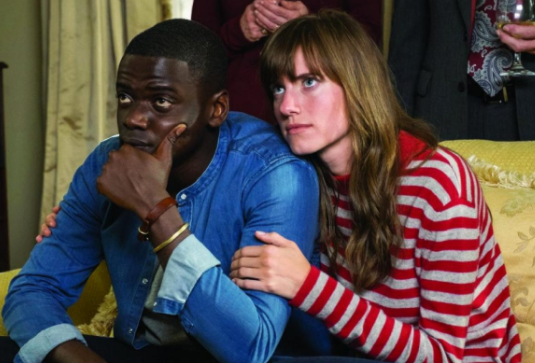There is a question earnestly posed by the protagonist of Jordan Peele’s Get Out, Chris Washington (Daniel Kaluuya), after he is met with an extremely surreal overture regarding what’s about to happen to him at the end of act two. As Jim Hudson (Stephen Root), a blind art dealer who “wants Chris’ eye” for photography explains everything that has led up to this moment, Chris asks him from the other side of the television screen: “Why us? Why black people?” And yes, many would like to know what the concrete response is to this. Jim answers in a way that suggests, quite disappointingly in its simplicity, it’s because white people secretly think black people are better (athletically) and, well, cooler–“black is in fashion.” In this exchange, Peele addresses some longstanding prejudices about how Caucasians view what Peele tongue-in-cheekly writes in the script as “the African American experience.” Harkening back to Dear White People, another satirical film from 2014 about white people treating black people like playthings designed for the sole use of cultural appropriation, Get Out takes this premise to the next level by driving home just how sinister the white approach is in “dealing with” black people.
And what better way to highlight this then through the lens (photographer pun not intended) of Chris being taken to Rose Armitage’s (Allison Williams), his white girlfriend, estate of a home for the weekend?–though, if you ask me, meeting the parents, Missy (Catherine Keener) and Dean (Bradley Whitford), after just five months is way too soon. While packing for the trip, Chris confesses his nervousness about going there, especially without Rose having “warned” them of his color. Leaving his dog in the care of his best friend and proud TSA worker, Rod Williams (Lil Rel Howery), Chris gets a sort of anti-pep talk from him before as he jokes that Rose must lick his balls regularly for him to agree to go into a white lion’s den.
On the way up, Rose hits a deer that gets sent flying into the woods, just half alive when Chris goes to check on it. Something in the deer’s eyes triggers an emotional reaction in Chris, both foreshadowing the same helpless, but dead looks he’s about to see in some other people’s eyes and the way his own mother died when he was eleven. After calling the police instead of animal control, Rose is forced to defend her boyfriend when the cop automatically asks for his identification in spite of him merely being a passenger. When Rose calls the cop out for his racism, Chris can’t help but feel closer to her, feeling the full weight of her protectiveness. Unfortunately, this protection doesn’t seem to extend to the bizarre interactions he ends up having with her family, including her jiu-jitsu loving brother, Jeremy (Caleb Landry Jones), who feels inclined to mention Chris’ “genetic makeup” at the dinner table. Though Rose apologizes for her family’s behavior later, it seems apparent that this is the sort of thing Chris is “used to,” brushing it off as just normal white people in suburbia comportment.
It’s only after going out for a smoke in the middle of the night and witnessing the highly unusual actions of the Armitages’ “servants,” Georgina (Betty Gabriel) and Walter (Marcus Henderson), that Chris begins to truly worry. As he goes back inside, a run-in with Missy, urging him to take her up on her previous offer to hypnotize him–her psychiatric specialty–leaves him in the uncomfortable position of allowing her to place him into the “sunken place” where he can only watch from within himself as a remote audience member. Between this and the neurosurgeon father, it’s no wonder the entire vibe of the estate feels emotionally fucked.
Just as Get Out opens with one of the pinnacles of white people music, Flanagan and Allen’s “Run Rabbit Run,” so, too, does it close with it. Only this time, the rabbits running are the white ones, so to speak, with Peele at last lending a sort of vicarious catharsis to generations past who would never have been able to get a movie made in which a black person overpowers a white person. At least not without a white savior to help him do it.
Equal parts The Skeleton Key (come on, you must remember that 2005 movie starring Kate Hudson) and The Stepford Wives, Peele has managed to reinvigorate the horror genre with something it’s been missing for a while now–which is a political meaning at its core. Think Samuel Fuller’s White Dog but subtler and for a more jaded generation. And, in truth, this is the best, most timeless form of the horror genre.
To be sure, one thing is absolutely clear, Allison Williams as a wispy white girl who eats Fruit Loops separately from a glass of milk that she sips in between each bite is the ultimate caution against falling for a tight pink pussy, no matter how much she insists she nor her family is not racist.




















